Pew Research Center Washington, D.C.
With the November mid-term elections approaching, the Pew Forum convened a roundtable discussion with three respected observers of religion and party politics.
Joining the conversation was Amy Sullivan, a former aide to former Senator Tom Daschle currently writing a book on faith and the Democratic Party, Ross Douthat, an associate editor at Atlantic Monthly, and John Green, a senior fellow at the Forum and co-editor of the new book The Values Campaign? The Christian Right and the 2004 Elections.
Speakers: Amy Sullivan, Contributing Editor, Washington Monthly
Ross Douthat, Associate Editor, Atlantic Monthly
John Green, Senior Fellow in Religion and American Politics, Pew Forum on Religion & Public Life
Moderator: Mark O’Keefe, Associate Director, Editorial, Pew Forum on Religion & Public Life
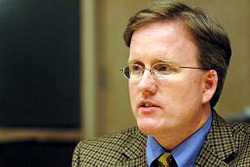
MARK O’KEEFE: John, you point out in the new book you co-edited, The Values Campaign? The Christian Right and the 2004 Elections, that, “The movement’s obituary has been written several times and was considered moribund after the 2000 election, only to display its influence once again in 2004.” As we approach the mid-term elections, many are describing the movement as potentially lethargic due to disillusionment. What’s your prognosis for the Christian right come November 7?
JOHN GREEN: The Christian right has had a history of ups and downs, where people have seen Christian insiders as either being 10 feet tall and dominating American politics and taking over the government, or moribund, failing, falling apart, disappearing. The truth of the matter lies between those two extremes. They have had years when they were more successful than others and years when they had a great deal of difficulty achieving their purposes. I suspect that this will be one of those years when it will be fairly difficult for the Christian right to mobilize its voters and have the kind of influence in campaigns that they would like to have. That is not to say that they will be inconsequential.
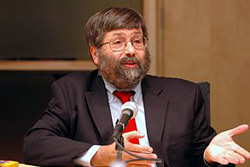
The Christian right faces some real impediments this year. Some of it is just the general disillusionment with the Bush administration. This is very typical in American politics; the longer a president is in power, the longer a party holds control of the executive branch, the more unpopular they become. So what we’re seeing in 2006 is the reassertion of a very common pattern, and that pattern affects Christian conservatives as well as other kinds of voters.
But in addition to that, there are some other problems. Many Christian conservatives believed they played a critical role in electing George Bush and the Republican Congress, and neither have delivered on the agenda they thought was so important. The recent revelations about Congressman Mark Foley have added to that sense of disquiet about the Republicans.
In response to that situation, it’s clear to me that the Christian right organizations like Focus on the Family, the remnants of the Christian Coalition and other groups at the state level are going to make a tremendous effort this fall to get their voters out to the polls in the face of these challenges. I suspect that they will have some success, but probably not to the level that we saw in 2004 or 2002.
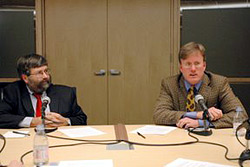
O’KEEFE: Now that the 2004 exit polls have been scrutinized, analyzed, and some would say overly emphasized, how important were moral values and “values voters” to the outcome?
GREEN: Voters that care about traditional morality are a large minority of American voters, and at the national level they are somewhere between 20 and 25 percent, depending exactly which measure you use. They vary state by state. In some states they’re much more numerous; in other states less so.
This group of voters, many of them deeply religious – a significant portion of them evangelical Protestants, but also including a broader group of religious people – were important in the grand mix in terms of a very close election. But they did not have the kind of dominant role that some analysts ascribe to them, and they’re not likely to have that kind of dominant role anytime soon.
O’KEEFE: Amy, what did you think about the emphasis on the moral values exit poll question?
AMY SULLIVAN: As someone who is trying to get Democrats to pay more attention to values issues and to cultural anxieties that voters have, I was happy to have people misunderstand the exit polls. (Laughter.) But I do think it’s clear that issues like national security and foreign policy seemed to weigh more heavily on voters’ minds when they were making their decisions in 2004 than these so-called values issues.
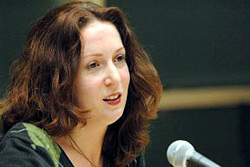
However, those issues do act as threshold issues for a large segment of voters. By that I mean most voters don’t go home at night and worry about abortion and gay marriage, but those issues are proxies for deep-seated concerns they have about the culture, about the stability of families, about how hard it is to raise their kids and battle with popular culture. In the absence of the Democratic Party addressing those concerns head on, Republican solutions to those concerns, whether it’s banning abortion or banning gay marriage, at least strike somewhere within the same realm.
Republicans have the right diagnosis of what concerns voters, but they present the wrong prescriptions. Some prescription is better than no prescription, though, so I think in 2004 that won out by default.
ROSS DOUTHAT: The values theme tied in easily to the way Republicans were trying to paint John Kerry, but also the way he actually was. You saw this particularly in his blundering statements on abortion and Catholicism. It wasn’t so much that a majority of the American public that wanted the Catholic bishops to deny him communion, or even agreed with the Catholic bishops about abortion generally, but the perception Kerry created was of a candidate who was what the Republicans said he was, which is to say aloof, elitist and out of touch with bedrock religious values. Even at the height of the Lewinsky scandal Bill Clinton never gave that impression because you believed whatever Bill Clinton thought about the issues, he really was a religious man who took his faith seriously.
Voters pick up on that. Whether it’s the determining factor, who can say, but it’s clearly an important factor.
SULLIVAN: I have to jump in for a second, though, and defend John Kerry, which is somewhat painful because I do think his campaign made a number of mistakes, particularly when it came to addressing the Catholic questions.
He faced a unique challenge in that his church has become politicized over the last few decades, and he and other Catholics are belatedly figuring out a better way of dealing with that head on. But it can be a very difficult thing when you are a political candidate out on the stump and your church is threatening you with spiritual sanctions. I am just starting to appreciate how difficult that was for the campaign. In the lead-up to the debates, there were a lot of arguments within the Kerry campaign about whether he should discuss his Catholicism, not because he was uncomfortable talking about religion, but because they were afraid that if he portrayed himself publicly as a good Catholic, then that would be like poking at stick at the bishops. Somebody might react by standing up and saying, “Get out of the church; you’re excommunicated.”
That makes it a completely different ballgame – it’s not just a political decision then; it’s a very personal religious decision.
O’KEEFE: Speaking of Kerry, in a September speech he said he wishes he had given before the 2004 presidential election, he described his religious life in much greater candor and detail than ever before. Senator Barack Obama and Pennsylvania Senate nominee Robert Casey, Jr., both Democrats, have also given recent speeches about their faith. What have Democrats learned from Kerry’s defeat? Did they, as Pew Forum senior advisor, E.J. Dionne, has said, find God in the 2004 exit polls?
SULLIVAN: I like E.J.’s phrase because it does describe how 2004 was a turning point for some Democrats who had been anxious to talk about religion but didn’t feel it was acceptable within the party. This gave them the go-ahead to just get out there, take off the muzzle, and be who they were. For others, it was an awakening that, sure enough, most Americans are religious, and they find it odd that a candidate would compartmentalize his religion because that’s not how they relate to their faith.
These new speeches are remarkable in that they are, for perhaps the first time, not defensive statements of religion by Democrats. Barack Obama is not going out there and saying, “I’m religious and I’m going to prove it to you because I’m a Democrat, and you think I can’t be religious.” He’s saying, “What are the responsibilities that fall on me as a religious person in public life?” Kerry is doing what many of us wish he would have done in 2004, which is state how his religious convictions form him as a political person.
This is something that we actually haven’t heard very often from Republican politicians. There is an assumption, “I’m religious, and so of course that informs my politics.” Most reporters make that assumption as well; they don’t push very hard. When this question came up in the debates a lot of Kerry’s answers sounded tortured, but he actually had a very thoughtful answer to how his Catholicism informed him as a public official, whereas when Bush got the question, he gave a very nice answer that a lot of people liked, but it was about how it meant so much to him that people prayed for him, which doesn’t explain how, as a public official, he is formed and his policy is informed by his faith.
GREEN: I had very much the same reaction to Senator Kerry’s recent speech. It would have been a very effective speech in the context of the campaign. It’s coming in a period when a lot of other Democrats are trying out these ideas – not only these prominent speeches we’re talking about but a lot of candidates are trying this out on the stump.
In my home state of Ohio, the Democratic gubernatorial candidate, Ted Strickland, a congressman running for governor who just happens to be an ordained Methodist minister, is talking about values very effectively on the stump and facing a candidate, Ken Blackwell the Republican nominee, who is strongly allied with religious conservatives.
One of the novel things in that race is the way the Strickland campaign has been able to deal with these issues, taking the ideas Kerry and Obama and Casey talked about publicly and actually putting them into practice in the campaign. He’s making some significant inroads into the religious vote in Ohio. He probably won’t win a majority of evangelicals but he may do very well among Roman Catholics and among mainline Protestants. This could be part of the turning point Amy was talking about.
DOUTHAT: This is made possible, though, not only by the Democrats finding God after 2004, but by the political weakness of the Bush administration. There are different models with which you can approach American politics. You can mix social conservatism with economic libertarianism; you can mix social conservatism with economic protectionism and so on. What the Democrats in a lot of places are doing is moving back towards some version of the traditional New Deal model, which is not the New Democrat Clintonian free marketer approach to politics, but much more a wedding of social conservatism to an economic message that resonates with the working class, particularly now when the economy is doing well for a narrow section of the population but isn’t doing as well for people without college degrees.
This is an area the Democrats have tried to exploit for a long time. There wasn’t quite so much of the religious element, but the Al Gore campaign in 2000 had a people-versus-the-powerful rhetoric, and a lot of failed campaigns in the ’70s and ’80s tried to go back to this model. The model becomes available as the Republican economic message seems not to be working. You can peel off a lot of those Catholic voters who had moved to the right on social issues and felt the Republican economic message was not, per se, the right message, but had made peace with it, thanks to either a booming economy or at least an economy that seemed to be doing well by them.
SULLIVAN: Ross has put his finger on something key here, which is that the Republican Party talks about social issues in a communitarian way, saying “What I do in my life affects you and yours, and we have a responsibility to each other as a society to live up to a certain morals and norms.” But they have wedded that with economic libertarianism, which has some limits in its appeal.
The Democratic Party has done the opposite. They’ve tried to say, “We have an economic responsibility to each other, but when it comes to social issues, what’s my life is mine and doesn’t affect you.” Both parties are trying to grapple with that, and perhaps Democrats are doing a somewhat better job right now in coming up with a model that is economic and social communitarianism, which goes back to the New Deal and William Jennings Bryan and seems to be at heart what really attracts voters.
I though it was just a gimmick that Democrats were starting to talk about the common good, and that this was just a catchy phrase to attract Catholic voters, but I’ve now talked to enough voters who bring that up unprompted and heard about a lot of focus groups where people are talking about phrases like “the common good,” and I think that’s very powerful. Whichever party figures out how to tap into that in both spheres – economic and social – is going to be the one that has some success in the near future.
GREEN: Both parties have some limitations on those grounds. There are, for instance, evangelicals who have been supporting the Republican Party and who supported George Bush very strongly in 2004 who now are talking about a more liberal or communitarian economic policy – that the problems of poverty and economic development and education are something that evangelicals ought to be concerned about, and maybe the strong free market and corporate economic policies of the Republican Party are not quite where they want to be.
But of course, in the Republican coalition, the business community is a major partner, and they want those types of policies. On the flip side, in the Democratic Party, talking about faith and values and adopting more moderate positions on cultural issues may work very well for some Democrats, but it runs up against a problem in that coalition because there are secular voters and voters with very liberal social views that are a critical part of the Democratic coalition.
What we see is both parties’ coalitions trying to adjust to these new realities.
DOUTHAT: Compassionate conservatism, as originally conceived, was supposed to address the concerns of evangelical voters that you just mentioned. Obviously, some of it ran up against the entrenched business interests in the Republican Party. But there is also this theory that after the 2000 election, Karl Rove changed his mind about the way to approach American politics. Going into 2000 there was a belief that a large majority was waiting to be claimed by a party that could move to the center on certain questions – in the case of George W. Bush, those questions seemed to be poverty and the role of government – and that this could push the Republicans from being a 48 to 51 percent party to being a 55 percent party.
What I’ve read is that Rove and Matthew Dowd, the Bush administration’s pollster, decided after the 2000 election that there weren’t actually any of these swing voters, that they had disappeared, and that the thing to do was simply to mobilize the base. This is a partial explanation, perhaps, for why compassionate conservatism didn’t fulfill the hopes that a lot of conservatives and moderates had for it in the 2000 election.
Whether that’s true or not, I’m not sure; it’s just something that gets bandied about in Washington. But it’s an interesting way of looking at it, whether the country is more or less permanently divided 50/50 and whether no matter what happens there isn’t a way to claim this larger majority – you could call it the common good – that people hope is out there.
GREEN: One of the interesting things about the 2000 election is that in retrospect we see it as very closely divided. My memory of the campaign, and most of the things that were written about the 2000 campaign, was that the country wasn’t that divided, and that to the extent that it looked divided, it was simply because both parties were running two moderates. Remember, George W. Bush was perceived as a moderate Republican and Al Gore as a moderate Democrat. Things were dividing up pretty evenly because we were fighting over the middle.
It wasn’t until after the election, partly due to the debacle in Florida but partly due to a careful analysis of the exit polls, that people saw this deep polarization. Of course, by 2004 that’s explicit, right? Both the Republicans and to some extent the Democrats understand that there is this division, and so the question focuses on base mobilization because both parties recognize there are not that many people in the middle. It’s interesting how this polarization crept up on people.
My colleagues and I, in the book previous to this one, The Diminishing Divide: Religion’s Changing Role in American Politics, wrote about how we thought the Christian right was going to decline after they helped elect a Republican Congress and George W. Bush, because we thought movements don’t do as well when their party or candidate is in power. Mark, you were talking about writing obituaries for the Christian right – we thought it was going to go at least into a period of decline, and that didn’t happen.
That was aided partly by this broader polarization, but partly because this new issue appeared, same-sex marriage, that I don’t think anybody on the right anticipated. Maybe there were people on the left that did, but maybe not even there. It was a new issue that reinvigorated this base mobilization strategy that, as you point out, may have already been adopted, at least by the Republicans.
O’KEEFE: John, you and others have said same-sex marriage was a pivotal values issue in 2004, giving President Bush and Republicans an important edge in Ohio and other key states. What do you see as the pivotal values issues this November?
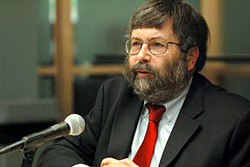
GREEN: To some extent, same-sex marriage is still a live issue. It will be on the ballot in a number of states; last time I counted it was six, but it might be more now. There are some counterpart ballot issues – the stem cell debate in Missouri and abortion provisions in South Dakota and Oregon and California. But they sort of fit in with the same-sex marriage issue.
The same-sex marriage issue may exhaust itself soon. I don’t think it will be this year but it will be soon, for a couple of reasons. One, all the states where it’s easy to put it on the ballot will have had it on their ballot in the near future – if not this year, then in 2007. Two, look at the way the courts are behaving. Remember, part of what sparked this whole issue was the decision of the Massachusetts Supreme Court to legalize same-sex marriage. But in courts in very liberal states like California and New York, these state statutes with the traditional definition of marriage have been upheld.
The fear of religious conservatives that “activist judges,” quote, unquote, were going to undermine traditional marriage everywhere has been reduced somewhat because the courts are not behaving like the Massachusetts Supreme Court uniformly across the country. So this issue that was critical in galvanizing Christian conservatives in 2004 may be running its course, and by 2008 it’s possible that this issue will have faded away.
I don’t know what the next issue will be. But I do know what Christian conservatives are trying to do: They’re trying to make foreign policy the next social issue. We have people like James Dobson, from Focus on the Family, talking about the war on terror as a family value.
DOUTHAT: In 2004 there was a conflation of the war on terror with these larger moral values questions, in part because that was Bush’s whole persona, and elections tend to hinge, to a certain extent, on what the candidates’ personas are. But that attempt is going to founder, primarily on the incompetence with which the war on terror is being waged, at least by the present administration. You can imagine, for instance, Giuliani as a candidate attempting to use the war on terror as a way to appeal to religious conservatives who would otherwise be turned off by his stands on social issues.
Events in Iraq, in particular, have made the idea of a Republican coalition in which all the parts work together – in which being anti-abortion goes well with wanting to invade Iraq – it’s made that untenable, at least in the near future.
Jody Bottum, who is the editor of First Things, wrote a piece a couple of years ago now called The New Fusionism, in which the old fusionism was social conservatives and libertarians coming together to fight communism. He said the new fusionism was neo-conservative idealists who wanted to spread freedom overseas and religious conservatives who wanted to protect the unborn at home bound together by a common understanding of human rights and human dignity. There was a possibility for that to be a real and potent alliance, but that possibility has been lost almost completely over the past two years.
SULLIVAN: I have a feeling this election is not going to be very useful in giving us a solid picture of where the electorate is and what social issues are moving people. We are likely to see something close to the midterm election in 1974 when you have a lot of depressed turnout on one side. Some of that was already in the works leading up to the past few weeks. As John said, there is disillusionment, not only among religious conservatives, but also among religious moderates who feel there is not the home for them in the Republican Party they had once thought. Instead of feeling there was no other option for them, and they simply had to vote Republican because it was their Christian duty to keep Democrats out of office, moderates are now hearing from a different kind of Democratic candidate in some places that makes it a little more palatable for them to support that party.
But certainly with the Mark Foley story coming up, I think that’s the last straw for a lot of folks who were on the edge about whether or not to weigh in with this election. They may simply stay home, which won’t tell us much about what will motivate them in 2008.
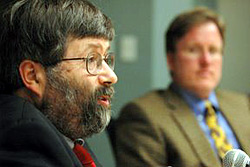
GREEN: That’s a really good point, that 2006 may not be a good test of what these things mean, certainly not in the clear way 2004 was. Partly it’s because this isn’t a national election. It may be more nationalized than your typical congressional election, but it’s really a series of state and local races, with a lot of different factors.
There are many Democrats at the state level who are much more attractive to religious voters than, say, John Kerry was at the head of the ticket, and likewise there are a number of Republicans at the state and local level who are not very palatable to religious people. It’s going to be a little harder to read the tea leaves. But also, even if this turns out to be a good Democratic year – and certainly that’s a real possibility – many of the races the Democrats might win will be decided by fairly small margins. If you have, say, the Democrats taking over the House by winning 20 seats but 10 of those seats are won by 51 percent, it will be hard to figure out what the overall trend is.
We’ll have endless speculation, but we will have to look to the national campaigns in 2008 to see how these things are playing out.
O’KEEFE: How disillusioned are Christian conservative voters with Republicans regarding the war in Iraq, a perceived lack of success on hot-button social issues, and the sex scandal surrounding former Florida Congressman Mark Foley? What impact do you think that disillusionment could have in November?
GREEN: The simple answer is if the disillusionment is large, it will be bad news for the Republicans. We may not see a wholesale desertion of Christian conservatives from the Republican Party; we may see depressed turnout. It might be very significant in some races, maybe less significant in others, but a lot of the contested House and Senate races are so close now that even a modest decline could make a difference. You wouldn’t have to have a huge desertion of the Republicans, just a 5 or 10% drop.
We’ll see a lot of effort on the part of Republicans and their allies to try to keep that from happening. Whether they’ll be able to pull that off or not remains to be seen because of these deep concerns.
The Mark Foley situation is potentially very problematic, and not just the Foley situation itself but the response of the House leadership, which is generally regarded as inadequate. We’ll have to see how this scandal unfolds over the next several weeks. But Christian conservatives, like moderates, like liberals, are affected by these broader issues, and Ross is right that the problems in Iraq are riveting a lot of people’s attentions and that can’t help but affect everybody in one way or another.
Then there are background economic issues. We have a big run-up in the stock market, which is pleasing some people, but if you go across the industrial Midwest, factories are still closing, and there’s a lot of uncertainty about the economy. That affects religious voters as well.
So there are a lot of issues that may lead to a small, perhaps, but decisive decline in turnout.
DOUTHAT: An interesting question is what happens to the Democrats in 2008 and beyond if they are successful this year, but only on a fairly narrow level with candidates like Robert Casey in Pennsylvania. There was a lot of outcry when Chuck Schumer basically hand-picked Casey to run against Sen. Rick Santorum from people in the Democratic Party who objected to Casey’s pro-life credentials. This is a question for Amy, I guess: Would a narrow victory by some candidates who talk about values issues, downplay the social liberalism and play up to the economic populism? Would that have a profound effect on the Democratic Party going into 2008?
How would it play into the other main phenomenon in the Democratic Party, which we haven’t talked about, the netroots phenomenon, which pushed Ned Lamont to the top in Connecticut? That’s a political phenomenon that’s been driven by the Iraq war. But the underlying values those people embrace are – when Markos Moulitsas’ Daily Kos was asked about his political orientation, he described himself as a “libertarian Democrat” and that tends to mean secular Democrat.
You have these two forces in the Democratic Party, both of which are seeing success, perhaps, in this election, and they’re pushing the party in separate directions, and I wonder what you think about that.
SULLIVAN: It’s always hard to predict how Democrats are going to react. Virginia Gov. Tim Kaine’s election last fall was quite powerful as test case for a lot of Democrats in a way I honestly didn’t see coming. For whatever reason, it seemed to convince a lot of people in the party you could run as a pro-life candidate who wasn’t necessarily going to be anti-choice. That is a very important distinction Democrats are starting to make at a party-wide level.
It will be important both to look at the Casey campaign, but also at the campaign of somebody like Bill Ritter who is running for Colorado governor as a pro-life Catholic Democrat. If candidates like that win, it will be largely without pro-choice money. That will perhaps give other Democrats some backbone to stand up to the choice groups and say, “We don’t need your money in order to win,” money that has been, up until now, an enormous factor in Democrats thinking they had to stay with socially liberal policies and that they couldn’t afford a move to the middle.
Ritter is an interesting case because he has not thumbed his nose at choice groups. He has worked with them to show that there is a difference between a Republican candidate who is pro-life and makes it his life’s work to outlaw abortion and a candidate who is pro-life personally but who isn’t going to go after abortion as a top agenda item and who may have much more success getting behind a program to reduce abortions and do that by reducing unwanted pregnancies. That’s an important distinction, particularly for a lot of Catholic candidates. That was something John Kerry talked about in his speech a few weeks ago that is a shift from what we’ve thought of as the Mario Cuomo model of abortion, which is, “I am personally opposed, but I can’t do anything about it; I’m not going to impose my religious beliefs on other people.”
If you’re going after abortion, not by restricting it – which is where the argument about imposing your beliefs comes – but by trying to reduce the need for it, you absolutely can combine your religious beliefs and your political beliefs. That’s not imposing them on anybody, but it’s also not standing up and providing this weird model of saying, “I’m religious but I’m not religious in my political life,” which, again, strikes voters as somewhat false.
GREEN: Your point about the Mario Cuomo model striking a lot of voters, and particularly Catholic voters, as false is a good point because if we switched the topic, just imagine a Democratic candidate saying, “I personally am against poverty, but I don’t want to impose my views on anybody by raising their taxes.” A lot of Catholic voters would find that a strange disjunction.
On the other hand, if a candidate said, “I’m very concerned about poverty; my church teaches me we need to do something about poverty; we need some public solutions but we can’t diminish economic growth too much because that’s critical” – that’s a more sophisticated position. It seems to be very parallel to the one you’ve just described on the abortion issue.
We may see a pretty fierce debate in the Democratic Party in 2008, particularly going into the presidential primaries. Some of these more sophisticated arguments will get a trial run, and it will be interesting to see how they play out. To me, the most interesting thing is to watch the perceived frontrunner in the Democratic presidential sweepstakes, Sen. Hillary Clinton, who’s already made some moves to adopt some of these positions. It will be very interesting to see how she continues to evolve on these issues.
O’KEEFE: Some analysts are predicting Catholics will be the “wild card” and the religious swing vote, in both the midterm and the 2008 presidential elections. George Bush did much better with Catholics in 2004 than he did in 2000. Do you agree that Catholics are the religious swing vote? If so, what do you think is going to swing Catholic voters?
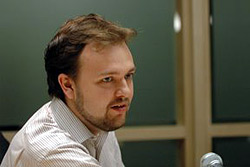
DOUTHAT: They’re the swing vote, but it’s a misleading term because it gives people the idea that Catholics vote as a block and that if you can just pick the right policies you can get 80 percent of Catholic votes, the way Republicans get some absurd proportion of Mormon votes, for instance, like 85 or 90 percent.
The reason Catholics are the swing vote is because the Catholic population has become so assimilated in the last 30 years. Catholics, more than any other American religious group, vote like the country as a whole, and the Catholic Church is a broad enough tent that it includes people of all religious persuasions in a way that most evangelical and Protestant denominations generally don’t. There are Catholic traditionalists, Catholic moderate traditionalists, Catholic centrists, Catholic liberals, Catholics who approach what we would think of as secularism.
So it’s not that you need to appeal to Catholics per se; it’s just that tracking Catholics makes a good proxy for tracking the rest of America. John knows much more about this issue than I do. But with that in mind, yes, it’s useful to look at Catholics and ask, “What will appeal to Catholics?” The success of the Bush administration in the last six years – it has been very successful electorally, particularly if you look at where the Republican Party was in the late 1990s – does reflect its ability to blunt the edges of Republican big business and economic libertarianism with ideas like compassionate conservatism, faith-based initiatives and fighting poverty. Many of these ideas haven’t been put into practice, but rhetorically, at least, they have removed weapons from the Democratic quiver that used to appeal to voters. But now the Republicans are reaching the day of reckoning, when the Bush administration has spent six years saying one thing and not quite doing it, or saying one thing and doing another, and now there is an opening for Democrats to run through.
It’s what I talked about before, this economic populism joined to social moderation. One of the interesting questions for 2008 will be who the Republicans nominate for president because there are candidates out there who could take the Bush message and do more with it than Bush himself did and maybe win back those Catholics voters who the Republicans lose this time around. On the other hand, if they nominate a figure like – well, it won’t happen now, but Sen. George Allen, who would just run as Bush but less impressive, then the Republicans would be in real trouble with Catholics and with the broader America they represent.
SULLIVAN: The two parties have opposite challenges when it comes to Catholic voters. I completely agree with Ross that to talk about the Catholic vote is just absurd because you have such a diverse array of constituencies within that umbrella. But it is true that what Republicans have in place is an extremely effective outreach machine that targeted Catholics leading into 2000, and definitely in 2004, which was a key race in terms of focusing appeals to Catholic, speaking in language that appealed differently to Catholic voters than other voters. But their policies don’t necessarily their campaigning. So it’s a logistical success that is not necessarily matched by coming through with policies.
Democrats have the opposite problem. They have a lot of politics that would appeal to Catholic voters. But in some cases it’s just as simple as not going out and asking for their vote. Tip O’Neill used to tell a story about a woman in his Boston neighborhood who came up to him after the election and said, “I didn’t vote for you.” He said, “Why not?” She said, “You didn’t ask me to.” Democrats have not been going to Catholics and asking for their vote.
An interesting test in 2004 was the state of Michigan, where the Democrats actually did spend the last two months of the election going after Catholic voters, sending out different mailings, particularly on the common good, talking about abortion reduction, not just choice, choice, choice all the time. They targeted phone calls to undecided Catholic voters. In fact, a group of nuns who were volunteers made some of the phone calls in 2004. So if you were an undecided Catholic voter and you got a call from Sister Mary Margaret – (laughter) – reminding you to vote – The results can’t be argued with; they got a much higher percentage of Catholics than in other states with similarly large Catholic populations. They got 15 points higher than Massachusetts among weekly church-attending Catholics.
Some of this success was just in approaching them, but I think another key is – not to obsess over the abortion issue, but it can’t be played down how important it has been among Catholic voters to talk about abortion in a way that makes pro-lifers feel welcome in the party. For the past couple of decades, whether it was conscious or not, the Democratic Party used rhetoric that made pro-lifers feel they were thought to be intolerant and unintelligent and therefore not welcome. Some of the solution is as simple as opening the big tent and saying, “All views on abortion are welcome here, and we are going to be the party that actually goes after trying to reduce abortion rates, more than the other side.”
GREEN: There isn’t a Catholic vote, as Amy and Ross pointed out. But I think Catholic voters are very important in 2006 and will be in 2008. It’s really an interesting shift from the past. If you go back 30, 40 years ago, the mainstay of the Democratic Party was white Catholics, and the mainstay of the Republican Party was white mainline Protestants. There were a whole bunch of other people out there, but those were the key groups.
Today, white Catholics and white mainline Protestants are very much in play. They are in play in different ways because they are different kinds of religious communities; the word “swing voter” is sometimes used as shorthand for being in play. There are in the Catholic community some genuine swing voters, people who really can’t make up their minds.
What you see in the Catholic community is diversity. One of the big questions for the Republicans is can they maintain the beachhead they have developed among traditionalist Catholics, and can they expand it? And one of the questions for Democrats is can they rally the liberal Catholics and the centrist Catholics to their cause? Amy’s example of what happened in Michigan is a very good one, particularly if you compare it to Ohio, a state very, very similar in many respects and of course a critical state in terms of reelecting President Bush.
The similarities between the two states in 2004 were numerous. For one thing, there were same-sex marriage amendments on the ballot in both states. Yet Catholics in Ohio voted for Bush to a much greater extent than they did in Michigan. There may have been some farsighted individuals in Michigan, or it may simply have been the result of the disorganization of a presidential campaign in which it’s hard to touch all of the bases the right way. Although there was a prodigious Democratic effort in Ohio, it was not organized to the extent that it was in Michigan. That in the end may have been the critical difference.
O’KEEFE: Our summer Pew Forum poll on religion on politics showed that while 85 percent of voters say religion is important to them, only about one in four, 26 percent to be exact, say the Democratic Party is friendly to religion. That’s 16 percentage points below the proportion that viewed Democrats as friendly toward religion just three years ago. What explains these declining numbers at a time when Democrats are trying to put more emphasis on religion?
SULLIVAN: John and I have talked about this several times. I am still perplexed by the numbers. I think it’s a combination of factors. Some of it is related to the fact that religious conservatives have done a good job over the last few years staying on message that liberals are hostile to religion, they want to do away with Christmas, and that activist judges are out to take religion out of every aspect of public life. The Justice Sunday events had quite an impact. The biggest drop was between 2004 and 2005. That is when you first started to see Justice Sunday organizing. Certainly this was a factor of the 2004 election. I think everybody is right in saying that the Democratic campaign and certainly John Kerry did not project an image of being the party that was like you, the party that shared your values, and that hurt the overall image of the party.
But also, Democrats jumped so quickly into adopting religion as the next new thing, it made sense that people interpreted that as a false move, and for many people it was a matter of counting votes instead of a real conversion into realizing that religious outreach was important. Anytime you do something that looks like pandering, people are not going to have a neutral reaction; they are going to react negatively.
That said, a plurality of Americans think that Democrats are neutral when it comes to religion. We have discussed the fact that because it’s an open-ended question, you don’t know what people are thinking when they hear “friendly.” They may be thinking friendly means a party prefers religious voters or religious communities. That may indeed be what people mean when they say the Republican Party is friendly to religion. Or they may just mean the party is welcome and opening to people of faith, in which case Democrats have a lot to worry about.
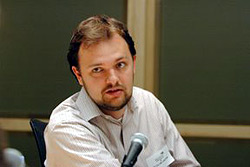
DOUTHAT: Let me suggest another explanation. We have talked a lot about Democratic outreach since 2004 to religious voters, and Amy has done yeoman’s work on this topic. Obviously there are lots of Democratic candidates who did hear what E.J. Dionne said and did read the exit polls and did get religion.
But one thing I found striking about the aftermath of 2004 – the aftermath of the moment when the first person read the poll and said, “Wow, values voters put Bush over the top” – the reaction I picked up on from institutions that aren’t part of the Democratic Party but are perceived as being affiliated with the Democratic Party, like the media and academia and Hollywood, was one of rank hysteria. You had columnists and pundits and book authors going on television and writing columns about theocracy in America and the end of the Enlightenment, a return to the Dark Ages and so on. I am a little biased on this front because I had to write a review essay of some of the books that came out of this.
Obviously they are appealing to a fairly narrow segment of the American population, but it does make a difference when in the year after an election that was supposedly determined by moral values, you have a wave of books making the case that this is the worst news possible for America, and it’s a signal that our secular republic is under siege from religious fundamentalists. The number of these books is staggering.
Obviously most Americans aren’t buying these books. But if you walk into a bookstore, if you turn on the television, if you pick up The New York Times, there is a large and vocal segment of the American population, most of whom vote Democratic, that is hostile to religion in public life, and more hostile I think than they were five or 10 or 20 years ago.
It’s a cyclical thing. You have a wave of secularism in the ’70s; religious conservatives react against it, and then naturally secularists react against religious conservatives, and so it goes. But this is the challenge for the Democratic Party that we haven’t talked about that much: How to integrate whatever successes they have with candidates who talk more openly about religion with the fact that one of the voices of the Democratic Party is always going to be Frank Rich or Sean Penn or whoever, these public figures quasi associated with the party who don’t want religion in public life.
Sean Penn is actually an unfair example. I’ll retract Sean Penn. Sean Penn actually may be perfectly friendly to religion in public life. He is just an example of the idea of the Hollywood Democrat.
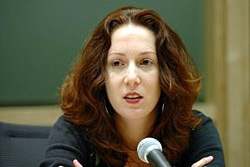
SULLIVAN: I have done a number of radio shows now, conservative radio shows, because there are very few liberal – (chuckles) – radio shows, where they will play me some stupid comment that Bill Maher makes about religion and then say, “This is what is hurting the Democratic Party.” I just want to say, “I will stop holding Pat Robertson and Jerry Falwell against Republicans if Republicans will stop holding Barbra Streisand and Whoopi Goldberg and Bill Maher against Democrats.”
I do agree there is a small segment out there that is hostile to religion in any form. The majority of people who express what appears to be hostility though are very uncomfortable with a certain kind of religion, and unfortunately they are associating that with all religion and letting a brand of conservatism that they dislike taint religion for everybody. That is part of what religious liberals in particular have been trying to push back against over the last few years.
Sometimes I’m not sure what to think about it, and in my happier days I’m pleased to see things like ads right now – in North Carolina there is a group called Devout Democrats and they are running an ad with former University of North Carolina basketball coach Dean Smith who says, “I have been a Baptist my whole life and I voted for Democrats my whole life,” – people coming out of the closet as liberal Christians. Moby is filming a public service announcement where he is talking about his faith and saying, “I’ve been a liberal and a Christian my whole life, and I’m trying to get other people who are like me to come out and highlight themselves that way.”
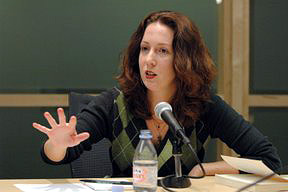
That will do more of a service in terms of having a better discussion about religion instead of having people stereotype each other. I agree with you, that theocracy nonsense drives me nuts, and it just hurts Democrats because in all of these Pew polls, when you ask people whether they have favorable or unfavorable reactions to the Christian right, only something like 16 percent of Americans have unfavorable reactions. If you go after the Christian right thinking you’re going to rile up voters and get them on your side, you’re actually alienating a good 80 percent of the population.
DOUTHAT: I would happily ban both Bill Maher and Pat Robertson – (laughter) – from all public utterances. But the problem for Democrats is that while Pat Robertson is a fringe kook, he is a fringe kook who is a little bit closer to the American mainstream, or at least he presents himself that way.
SULLIVAN: He wants to assassinate world leaders.
DOUTHAT: If we are talking about assassinating world leaders, that is very close to the American mainstream. I bet if you took a poll right now of whether we should assassinate Kim Jong Il, we could get 85 percent of Americans to say we should. (Chuckles.) I think when Pat Robertson says things like that he is actually representing the raging id of about two-thirds of the country. (Laughter.)
GREEN: Two of the most interesting developments to me since 2004 are, first, the development of not only liberal Christian voices, but also liberal voices in a broader set of faith traditions. The wakeup call after 2004 wasn’t just for Democratic candidates; it was also to moderate and liberal Christians who came to the conclusion that they ought to be out there speaking their minds.
We have seen a whole set of organizations develop. It will be a little while before they are as effective as their counterparts on the right, but an awful lot of liberal Christians are defending religion to their secular allies and making the point, to pick up on what Amy said, that religion per se is not bad. There may be certain kinds of religion that are problematic, but overall, many of the most cherished values in American public life come out of religious traditions. That is really interesting. We looked for it in 2004 and found it just beginning. But post-2004 there was this great blossoming of efforts and that is something under-appreciated by observers as well as participants.
The second thing is, as we have discussed, that the Democrats have a tension between religious constituencies and secular constituencies. There is a similar problem developing among the Republicans. Think of former Senator John Danforth’s new book which is a fairly nuanced and sophisticated argument, but basically a claim that the Republican Party has become dominated by the Christian right. Certainly Senator Danforth, as an Episcopal priest, certainly believes there is a role for religion and public life, but he thinks his party has gone a little too far.
In a lot of the close elections this year, if you look at the polls, you can see mainline Protestants and more moderate evangelicals expressing concern that maybe the party has moved too far to the right or highlighted a particular kind of religion they don’t completely share.
So there are a couple of other developments going on that are well worth watching. I don’t know how much impact they will have this year, but again it’s something to look for in 2008.
O’KEEFE: Our summer poll also showed that just under half of evangelicals say the GOP is friendly to religion, a decline of 14 percentage points in the past year. Ross, what explains this drop when we have an openly evangelical president, Senate majority leader and speaker of the House – all Republicans – who frequently talk about religion?
DOUTHAT: The easy answer is probably Jack Abramoff. He can stand in for the fact that public perception of the Republican Congress in the last couple of years has become associated with inside-the-Beltway corruption.
Combine that with a certain percentage of evangelicals – I don’t think it’s a huge percentage – who are actively angry about the lack of progress on an amendment banning gay marriage and so on, and when you factor in – it’s forgotten a little bit now, but the botched handling of the Harriet Miers and then Alito nominations, probably one of the most blatant attempts to pander to evangelicals that the Republicans have ever done.
It was the first time where you more or less explicitly had a Republican candidate saying, “We are playing identity politics too, and instead of a black man or a woman or something, we are nominating one of ours.” It didn’t work, and it didn’t make evangelicals happy; it didn’t make other conservatives happy.
Those three things, the corruption, the lack of movement on same-sex marriage, and the mishandling of what should have been a real victory for the Bush administration in getting two conservative justices approved has all played into that. People are affected in their perceptions of party friendliness to religion just by outside factors. I wouldn’t be surprised if the botched handling of Hurricane Katrina had contributed to voters saying the Republicans are less friendly to religion, even though there isn’t a direct connection between the two.
You give the impression of being an incompetent party in hock to cronyism and big business, and this is where the Democrats come in. They say, “Those are religious values, not being corrupt and being able to help the city in extremis.” The Republicans have just had a very, very bad couple of years.
O’KEEFE: Which politicians, Democrat or Republican, really “get it” regarding religion?
SULLIVAN: I’ll take the Democratic side and leave it to Ross to point out the stars in the Republican Party. I was one of the many people who was extremely impressed with Barack Obama’s speech this summer, not necessarily because he is such a compelling figure, although he is for a lot of people, but because the way he addressed religious issues was at least eight or 10 steps ahead of where most of his Democratic colleagues are.
[the biblical prophet]
I do think Hillary Clinton knows how to talk about culture and values in a way that most of the party would like to hear if they didn’t already have very set ideas about who Hillary Clinton is. I think it’s unfortunate for her that she has been a devout Methodist her entire life – taught Sunday school the whole time she was down in Little Rock. She is perhaps one of the most religious first ladies we have had, perhaps even one of the most religious Senators, and yet that conflicts entirely with the picture most Americans have of her.
They know that she is politically liberal and that she is not religious. When she comes out speaking as a religious or political moderate who is a person of faith, it looks like she is positioning for the White House, which, as I said, is unfortunate for her because she could be a good voice in the party on religion and on values issues. But she will be discounted unless she does the unusual thing of deciding and announcing that she is not running for the White House, in which case she would have a much better chance of being seen simply for who she is.
On the House side, I would say there a number of people – Rosa DeLauro is doing a lot of organizing among Catholic Democrats and getting them to have a little spine and stand up for who they are, maybe stand up against the bishops. Jim Clyburn is certainly a leading voice in the House and their faith working group. A young congressman like Tim Ryan is leading the charge with the abortion reduction effort and has a bill he introduced a couple of weeks ago. He is perhaps young enough and new enough to not realize that he shouldn’t be jumping straight into the abortion issue; because of that he may have what it takes to actually get some action on it.
O’KEEFE: Ross, from your vantage point, who really gets it?
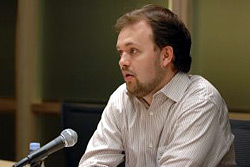
DOUTHAT: The challenge on the Republican side is always to start with the basic hot-button issues like abortion and same-sex marriage and then expand outward. The people who have been trying to do that are figures like Senators Sam Brownback and Rick Santorum. The problem for both of them is a separate problem that religious conservatives often run into, of being perceived as a moralizing prude.
Brownback has taken on AIDS in Africa and prison reform, and Santorum has worked on poverty, specifically critiquing the libertarian wing of the party and saying, “No, conservatism has to be about “the common good” – In both instances, they have taken religious conservatism in directions it needs to go if it’s going to stop being an interest group and become more of a majority force in American politics. But Santorum is so personally polarizing, so good at putting his foot in his mouth and appearing unctuous and preachy. That is why in spite of his good strategic efforts, he finds himself where he is today.
I have been impressed from a distance by both Massachusetts Gov. Mitt Romney and Arkansas Gov. Mike Huckabee, in different ways – Mormon on one side, evangelical on the other. In Huckabee’s case, it’s been more doing what Brownback and Santorum have done and expanding it to talk about broader social and economic issues. He expanded child healthcare in his state, for example.
In Romney’s case it’s been the ability to take on questions like stem cells, for instance, where so often the Republicans are stuck defending what is obviously an extremely unpopular position, and the way they usually defend it is just Bush style; you make a couple of vague statements about the sanctity of life, you hash out some compromise, and you hope people will stop talking about it. Americans are happy to vote for someone who they disagree with on an issue if that candidate can express his convictions in an articulate and intelligent and heartfelt way.
Romney has the problem of having changed his position on life issues somewhat in the last 10 years, but he has the advantage of being one of the most articulate, competent, and moderate-seeming politicians in American life. He has played issues like same-sex marriage and stem cells in Massachusetts very well, particularly in a very liberal state. It will be interesting to see what happens to him in 2008, particularly with the Mormon question.
O’KEEFE: John, I’ll give you the last word if you care to take it.
GREEN: American politicians will occasionally talk about faith, but as a group they are not a very religious crowd. Amy mentioned the interesting question of how Hillary Clinton may handle these issues and her personal religiosity, which is extraordinary if you look at people in public life.
But the counterpart in the Republican side is how Sen. John McCain will deal with this issue. McCain is making all of the “right moves,” quote, unquote, for his presidential campaign. The people that I know who know McCain say he has a soldier’s faith. Of course that is his background. It’s very important to him personally, but he has not expanded it to cover a bunch of other issues, and it will be interesting to see if he tries to do that.
The problem that McCain faces right now is he could be perceived as pandering, reaching out to religious conservatives with whom he disagrees simply because he needs their votes to get the nomination. But there is a potential for McCain, who has shown a capacity for deep thought, to broaden his approach to faith, so it doesn’t look like pandering, so it looks like the real deal. It will be really interesting to see how his campaign progresses in that regard.
This transcript has been edited for clarity, style and grammar by Andrea Useem.